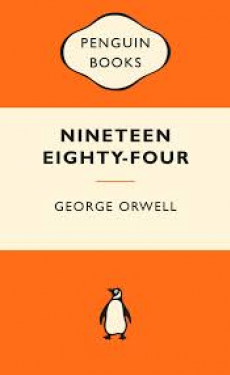
Nineteen Eighty Four by George Orwell is rated as one of Britain’s classic books. As seen on school curriculums everywhere, this novel written during the Cold War depicts a horrible future for the world, in the year 1984. Orwell’s portrayal of the future may not completely have come true, and we can be glad about this, but on some aspects he was spot on – his “telescreen”, the TV that listens to your conversations, has become a reality with Samsung’s new “listening TV”. Scary stuff, eh?
The storyline follows Winston, an employee of the dictatorship and government. The regime promotes itself as a paternalistic system – “Big Brother is watching you.” But, it is actually cruel and invades all aspects of private life. So much so that there isn’t even such a thing as private life. People in the regime learn to hate all things joyous and individualistic, and “love” the horrendous regime. Winston becomes disillusioned and embarks on a romantic (and political) affair with other employee Julia. They are ready to join the revolution, but is the revolution what it says itself to be? Will the revolution be successful? Do Winston and Julia ever get a moment to themselves?
If you like characters you can relate to, or maybe just like, this book isn’t for you. Not even the heroes are very likeable – Winston is quite dull, dispassionate and basically pathetic. Julia is more vivacious but apparently fickle and quickly bored. Thinking about it, the only really ‘likeable’ characters are the people Orwell describes as “proles”. These people are essentially ordinary folks like you and me, the urban working class. They are not so deeply involved with the regime, and seemingly live more enjoyable lives as a result.
A common misinterpretation of this text is that Orwell was writing about the risks of a Communist future, especially when we consider the context it was written in. However, Orwell himself was a dedicated Socialist and believed that left-wing regimes did not have to be like the one in Nineteen Eighty Four. In fact, we might be best off seeing Big Brother as a mix between Nazism and Stalinism, as both left-wing and right-wing regimes can become similar when they reach the totalitarian end of the scale. The view that Orwell was a right-wing critic of Communism comes mainly from American readers in the 1950’s.
Orwell even invents his own language for this gloomy future. It’s called Newspeak, and is basically a perversion of Standard English. All the words are shortened and made simpler, and weird English grammar rules no longer apply. Sounds great, but there’s a hidden motive. The government eventually wants to eradicate all words that indicate opposition to the regime, so the human vocabulary will become smaller, and people will no longer be able to express their dissent. The thought behind this is that if people cannot express their disagreement, they will not know what dissent actually is, and therefore literally cannot oppose the regime. They will have no grounds to.
Around the year 1984, people started looking at whether Orwell’s predictions had come true. Many had not, but the notion that technology holds the key to dictatorship and tyranny is still relevant today. This can be seen in the government’s hacking of phones and emails, and listening into our conversations. We might not have Big Brother just yet, but we could be on the way.
Image from: http://www.penguin.com.au/products/9780141187761/nineteen-eighty-four

0 Comment:
Be the first one to comment on this article.